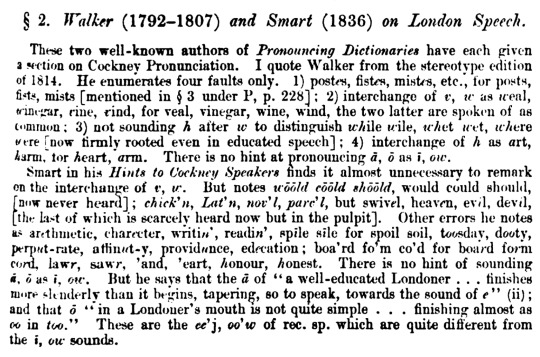#i should be in class and not going down another rabbit hole but by jove you can't stop me
Explore tagged Tumblr posts
Text
Having a field day with Ellis's (1889) Existing Phonology of English Dialects discussion of Cockney, I have absolutely no experience with historical English dialectology and therefore I cannot judge the accuracy of his data, but the comments that he's collected are fascinating nonetheless:

[Image Transcription:
§ 2. Walker (1792-1807) and Smart (1836) on London Speech.
These two well-known authors of Pronouncing Dictionaries have each given a section on Cockney Pronunciation. I quote Walker from the stereotype edition of 1814. He enumerates four faults only. 1) postes, fistes, mistes, etc., for posts, fists, mists [mentioned in § 3 under P, p. 228]; 2) interchange of v, w as weal, winegar, vine, vind, for veal, vinegar, wine, wind, the two latter are spoken of as common; 3) not sounding h after w to distinguish while wile, whet wet, where were [now firmly rooted even in educated speech]; 4) interchange of h as art, harm, for heart, arm. There is no hint at pronouncing ā, ō as ī, ow.
Smart in his Hints to Cockney Speakers finds it almost unnecessary to remark on the interchange of v, w. But notes wōōld cōōld shōōld, would could should, [now never heard]; chick'n, Lat'n, nov'l, parc'l, but swivel, heaven, evil, devil, [the last of which is scarcely heard now but in the pulpit]. Other errors he notes as arethmatic, charecter, writin', readin', spīle sīle, for spoil soil, toosday, dooty, perput-rate, affinut-y, providunce, edecation; boa'rd fo'm co'd for board form cord, lawr, sawr, 'and, 'eart, honour, honest. There is no hint of sounding ā, ō as ī, ow. But he says that the ā of "a well-educated Londoner...finishes more slenderly than it begins, tapering, so to speak, towards the sound of e" (ii); and that ō "in a Londoner's mouth is not quite simple...finishing almost as oo in too." These are the ee'j, oo'w of rec. sp. which are quite different from the ī, ow sounds.
/End Transcription]
Also, and I'll just link the page scan (hopefully it works if you don't have a university library login? it's in public domain) of notes from Lackington's 1817 list of London mispronunciations but there's the glorious note on "leeftenant pronounced levtenant [leftenant, now usual]", which really makes you think. Anyways, I just find the historical evolution of Cockney really interesting, because it's an accent that has a very clear stereotyped version for lots of English speakers today, but a lot of those features came about in the mid-to-late 19th century, and it's fascinating to think that what was a defining feature of the dialect (like the interchange of w/v) has just completely disappeared off the map, while the distinct vowels were just not a thing at all. Really goes to show how fast spoken language evolves, especially outside of the standard, and we love to see it <3
#i should be in class and not going down another rabbit hole but by jove you can't stop me#'i have no background in this' i say in the voice of a guy who has a linguistics degree#and also literally talked about some of these very guys in one of my classes because my advisor did a thing with them#i mostly just mean that i'm not extremely well versed in the historical context and as such can't evaluate the source#i'm just continuously fascinated by patrick o'brian's ability to capture speech patterns which i've never heard#and i'm trying to figure out if they're historical or just english/british or some combination of both#you will note that killick has the w/v switch ('wittles is up')#i would just really like to pick mr. pob's brain about where he got his speech patterns from but since he's not around i'll do it myself#i suspect it was from reading a lot of period sources but alas i don't have time for that :(#anyways now anytime you read a book set in the age of sail you have to imagine them saying it leeftenant! have fun :D#adventures in historical sociolinguistics#perce rambles#also funnily enough i had a student last year who would say /tɛstɨz/ for 'tests'#but i suspect that it was not because they were reviving late-18th c. cockney speech#i do wonder where they got it from though. like i guess it makes sense linguistically it's just no one else was doing it
1 note
·
View note